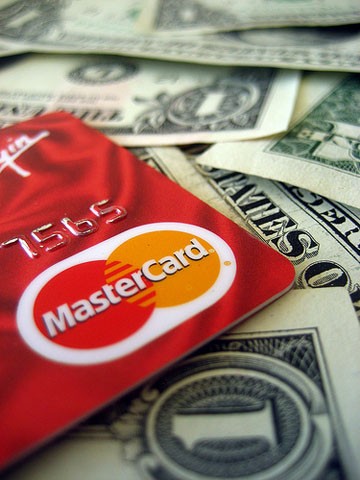Central Mass Colleges Score Over $150K From Credit Card Agreements
Wednesday, January 09, 2013

The CFPB found that, between 2009 and 2011, the number of such agreements, the number of open accounts, new accounts and the amount of payments all decreased during the two-year period. The Bank of America subsidiary FIA Card Services, N.A. accounted for 633 agreements, or almost 80 percent of all those in effect in 2011.
Due to recent changes in federal laws, schools are no longer allowed to solicit credit cards to students, but cards issued to alumni through agreements between credit card companies and alumni associations still provide substantial payouts to some schools and are sometimes a critical source of funding for programs that benefit students as well as alums.
A Critical Support for Programs
In 2011, six Central Mass colleges and alumni associations received a total of $151,514 in payments from credit card issuers, according to the CFPB's database, though several of those agreements were no longer in effect as of January 1, 2012.
The College of the Holy Cross General Alumni Association accounted for the majority of those dollars, bringing in $112,980. According to Director of Alumni Relations Kristyn Dyer, the Holy Cross Alumni Association has had an agreement with Bank of America for almost 20 years to provide credit cards to the school's alums.
"It really is kind of the backbone of our budget," said Dyer, noting that two-thirds of the Alumni Association's funds come from the use of alumni credit cards, for which the association receives one-half of 1 percent.
That one-half of 1 percent adds up. In 2011, the Holy Cross Alumni Association's credit card agreement brought in $112,980, which in turn funds $80,000 in scholarships, sponsors 16 internships and a host of other programs.
With the marketplace so flooded with credit card offers from banks and credit card companies, the alumni association cards, which are available to all Holy Cross graduates and bear the college's insignia, are one way for the school to get alumni to sign up for the cards and help keep such programs funded and operational.
"We rely very heavily on this," said Dyer.
The Worcester Polytechnic Institute Alumni Association brought in the second-most dollars through credit card agreements in 2011, with $21,169. However, the school's program with Bank of America was discontinued last year.
In all, Massachusetts colleges, universities and alumni associations received $2,903,796 in credit card agreement payments in 2011. Topping the statewide list were Boston College with $1,096,961 and the Harvard Alumni Association with $1,000,000.

Consumer Knowledge Key to Successful Credit Use

Deirdre Cummings, legislative director for the Massachusetts Public Research Interest Group (MASSPIRG), said there had been a number of concerns surrounding the marketing of credit cards to students on college campuses under credit card agreements with schools, noting that credit card companies previously used a number of tactics to get young people signed up and carrying their cards in their wallets.
Methods ranged from offering kickbacks, profit-sharing and incentives to campus groups for the aggressive marketing of credit cards to free giveaways and gifts such as frisbees and t-shirts.
While individuals over 21 years of age are typically required to demonstrate that they have income or have a cosigner in order to received a credit card, said Cummings, historically, credit card companies would waive that requirement for college students.
"Are they offering credit cards to somebody that has any likelihood or ability to pay?" she said. "We do know that students and adults get into trouble when they are offered credit and then extend themselves and dont have the ability to pay that back."
According to Cummings, data has shown that the first credit card that someone receives is the one they stick with the longest and that even small gifts can have a significant impact on the sale of a particular item or financial tool.
Recent changes to credit card rules and regulations have been designed to minimize such aggressive tactics, and colleges no longer permit the soliciting of credit cards to students on campus, but Cummings said it is still too early to tell if the decline in sign-ups and agreements documented in the CFPB's data is due to those changes or to the overall slowdown of the economy, which has made it more difficult for not just student, but anyone to obtain credit.
However, Cummings said MASSPIRG is keeping an eye out for companies who may be exchanging credit cards targeted at students for debit cards instead, which can pose their own set of problems.
"The big concern we have there is that students can get into trouble with a debit card because their financial aid often comes right into the debit card account," she said, noting the ability of overdraft fees and other penalties to quickly pile up, especially when minimum required balances are involved.
Whether a student or an alum, potential credit card subscribers need to weigh their options and understand the financial product they are signing up for, as well as the potential costs and drawbacks that might come along with it.
"The credit card companies aren't going to give you anything for free and it's up to the consumer to figure out if this is, comparatively, a good deal or not."
Related Articles
- College Admissions: 10 Scholarships Anyone Can Apply For
- Keys to Surviving Credit Card Debt
- LEGAL MATTERS: Credit or Debit Card When Holiday Shopping?
- Mass Credit Union League Endorses Warren
- Nichols College Scores a $5 million Gift
- NEW: Holy Cross Named a “Most Loved College”
- College Admissions: 5 Things You Need to Know About Financial Aid




 Delivered Free Every
Delivered Free Every
Follow us on Pinterest Google + Facebook Twitter See It Read It